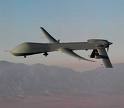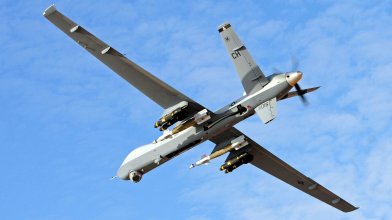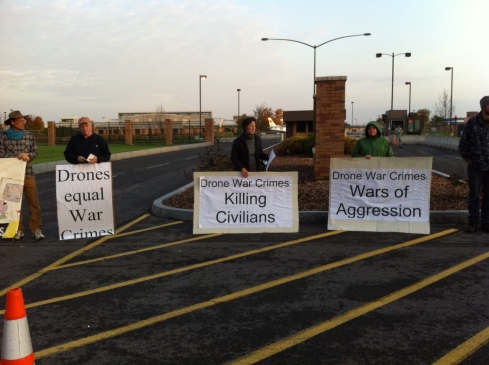Mounting Opposition to Drone Warfare

 US drones struck in Yemen and Pakistan this past week after something of a pause. On Weds (17 April) US drones hit a house in North Waziristan killing five people including an alleged commander of the Pakistan Taliban, On the same day according to Associated Press US drones undertook two strikes 100 miles south of the capital Sana’a. Five people were killed in the strikes, one on vehicle and one on a house. Local journalist Farea Al-Muslimi live tweeted the attack, and reported in an article for Al Monitor that the apparent target of the strike, Hammed al-Radmi regularly took part in meetings at the local government headquarters and thus could have been captured. A further drone strike took place yesterday (21 April ) in Yemen killing two suspected militants.
US drones struck in Yemen and Pakistan this past week after something of a pause. On Weds (17 April) US drones hit a house in North Waziristan killing five people including an alleged commander of the Pakistan Taliban, On the same day according to Associated Press US drones undertook two strikes 100 miles south of the capital Sana’a. Five people were killed in the strikes, one on vehicle and one on a house. Local journalist Farea Al-Muslimi live tweeted the attack, and reported in an article for Al Monitor that the apparent target of the strike, Hammed al-Radmi regularly took part in meetings at the local government headquarters and thus could have been captured. A further drone strike took place yesterday (21 April ) in Yemen killing two suspected militants.
While we continue to get no details of US and UK drone strikes in Afghanistan beyond bald figures, this week Congress was notified of a $95 million sale of 500 Hellfire missiles to the UK of the ‘P’ and ‘N’ variant. The ‘P’ variant is specifically designed for use by drones while the ‘N’ variant has a thermobaric warhead and it may be, as we have previously reported that this variant too may be being use on British drones.
While the drone wars plod on, opposition continues to grow. Ten days ago a coalition of US human rights groups including ACLU, Amnesty International and Human Rights Watch wrote to President Obama questioning the legal basis for targeted killing and calling for an end to the secrecy surrounding the use of drones. (full letter here) A coalition of US faith group also wrote to the President challenging the growing use of targeted killing and highlighting the danger of remote warfare. On this the letter states:
“Military trainers know that human nature itself serves as a check on lethal violence. Coming face to face with someone described as an enemy requires a deliberate choice to override a deep human instinct against killing. Remote, technical warfare removes that very human check. As a society we have not adequately considered where this development leads us as a species. The remote nature of this type of deadly violence has the potential to encourage overuse and extension of the policy to more countries and more perceived threats.”
On top of these civil society groups, the President of the International Committee of the Red Cross (ICRC) Peter Maurer also met with President Obama this week and urged restraint on the use of drones. The Bureau of Investigative Journalism reported that at a press conference following the visit, Maurer said ’The US is very aware… of where we disagree with the use of drones.’
Protest groups continue to demonstrate against the use of drones. In the US five people were convicted of trespass this week after blockading the entrance to Hancock Air Force base from where drones are controlled over Afghanistan. The five, who face jail time and fines, will be sentences on April 24. Brian Terrell who was jailed for six months following an anti-drone protest at Whiteman Air Force base in Missouri, remains in prison and will be releases at the end of May. Many local US peace groups are currently taking part in a month-long anti-drone campaign, with dozens of actions taking place across the US.
Here in the UK, campaigners are gearing up for a large protest planned for next week at RAF Waddington, the UK’s new centre of drone activity. Hundreds will march on the base to call for an end to drone warfare. Meanwhile a number of MPs are beginning to express opposition to the use of drones, (see for example the MPs quoted in this Daily Mail article reveling that UK company Cobham are supplying components for US Predator drones) while the the All Party Parliamentary Group on Drones goes from strength to strength.
While the continuing use of armed drones seems inevitable to the drone lobby, the breath of opposition on legal, ethical and humanitarian grounds means that the future is far from certain.


